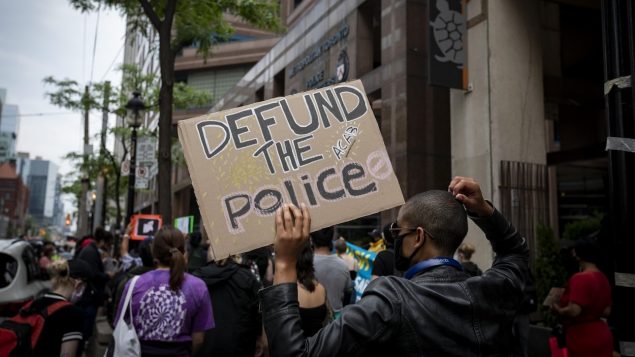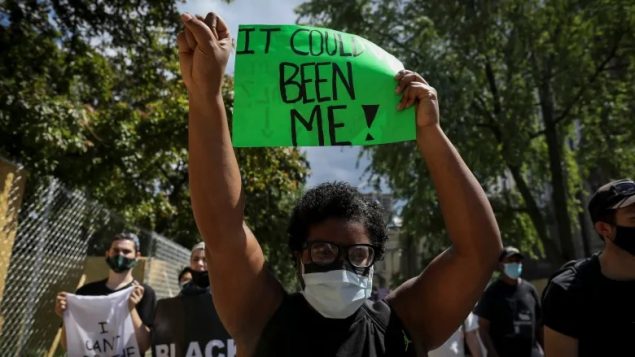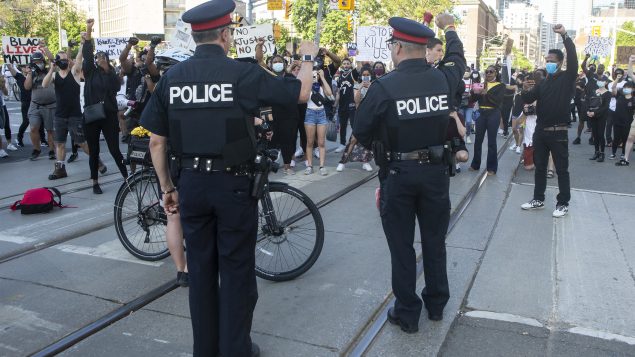In the spring–after George Floyd was killed by a Minneapolis policeman–many, many Canadians took to the streets to protest what they said was a scourge not limited to our neighbours to the south.
Systemic racism, demonstrators said, is very much alive and well in this country.
Some other Canadians–including RCMP Commissioner Brenda Lucki--downplayed the idea, prompting debate across the country that involved Prime Minister Justin Trudeau.
Now, a new report by the Ontario Human Rights Commission appears to support the claims–and fears–of the demonstrators–at least in Canada’s biggest city.

An Ontario Human Rights Commission investigation that began in 2017 found that Black people in Toronto are “disproportionately” arrested, charged and subjected to use of force by the city’s police force. (Evan Tsuyoshi Mitsui/CBC)
“The likelihood of a Black person being shot by police in Toronto is just as high as for a Black person in the average city in the United States,” Ena Chadha, the OHRC’s interim chief commissioner, said Monday.
Chadha made the comment following the release of the report, which found that Black people in Toronto are “disproportionately” arrested, charged and subjected to use of force by the city’s police force.
“The time for debate about whether systemic racism or anti-Black racism exists is over,” Chada said.
The report found that Black people are more likely to be “arrested, charged, over-charged, struck, shot or killed by Toronto police.”
It also found that despite the fact that Black people represent only about 8.8 per cent of the city’s population, they represented almost a third of all charges in the data.
The findings are part of the commission’s second interim report into anti-Black racial profiling and discrimination by the Toronto Police Service.
Titled “A Disparate Impact,” it analyzed Toronto police data from 2013 to 2017.
It found that only a fifth of all charges laid in that time frame resulted in a conviction, but charges against Black people were more likely to be withdrawn and less likely to result in a conviction, which the commission says “raises systemic concerns about charging practices.”
The data analyzed by the OHRC also shows that Black people represent 38 per cent of people charged with marijuana offences, despite conviction rates and studies showing they use cannabis at similar rates to white people.

There have been a number of Black Lives Matter protests and demonstrations calling for the defunding of police in recent weeks. (Evan Tsuyoshi Mitsui/CBC) theSIU report also found that officers sometimes lacked a legal basis for stopping or detaining Black people, searched them without justification and made unnecessary arrests and laid unnecessary charges.
Included among the report’s other findings was data that showed Black people represented 34 per cent of people involved in single-charge “out-of-sight” driving charges like driving without insurance.
Black people were also involved in 25 per cent of all investigations from the Special Investigations Unit (SIU), which probes incidents of death, serious injury or allegations of sexual assault, the report found.
They were also involved in 39 per cent of cases involving “low-level” use of force, which doesn’t meet the SIU’s threshold for an investigation.
The CBC’s Adam Carter reports that In a statement issued Monday, Toronto police and the city’s police services board said they view the report as being “vitally important [to] our continued efforts to critically examine and act to address anti-Black racism.”
“The Toronto Police Service is committed to accountability and community input to ensure we foster a human-rights based approach to policing and combating systemic racism. We are continuing to work on ensuring that equity and anti-racism are built into all of our policies and practices,” Toronto police’s Interim Chief Jim Ramer, said in a statement in a news release published Monday.
Ramer declined an interview request from CBC News.

Deputy Chief James Ramer took over a Toronto’s chief of police on Aug. 1 when Mark Saunders retired. (Martin Trainor/CBC)
Carter writes that Monday’s news release “also lists a number of measures the board and police say have been instituted to combat anti-Black racism in recent years, like the creation of an equity, inclusion and human rights unit, as well as anti-Black racism training and the implementation of a race-based data collection strategy.”
The first interim report–released in December 2018–found that between 2013 and 2017, a Black person in Toronto was 20 times more likely to be shot and killed by police than a white person.
“[The report] confirms the long-standing concern of black communities that they are overrepresented in incidents of serious injury or deadly force involving the TPS,” the report said.
“Our interim findings are disturbing and call for immediate action,” said Renu Mandhane, the OHRC’s chief commissioner at the time.
With files from CBC News (Adam Carter, Nick Boivert), The Canadian Press (John Chidley-Hill)







For reasons beyond our control, and for an undetermined period of time, our comment section is now closed. However, our social networks remain open to your contributions.